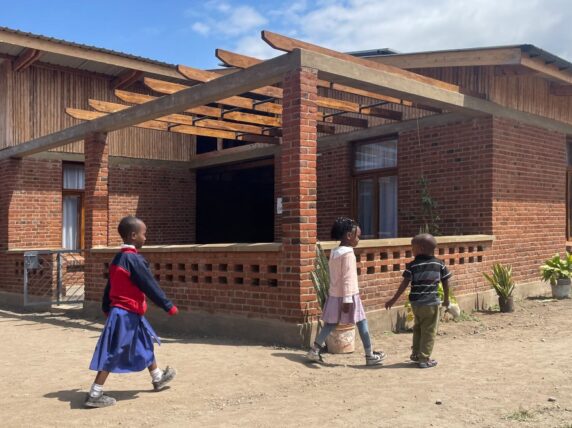Meeting people where they are at? Sure, just don’t leave them there
It’s a laudable aim to engage groups who have lost faith in international institutions and progress and “meet them where they are at” as the We The Helpers campaign set out to do.
In an increasingly polarised world, reaching a range of audiences – including those who are sceptical of “aid”- is vital for building broad public support to tackle the issues of global poverty, injustice and inequality collectively.
However, when talking about “aid”, we have a duty to move beyond narrow, tired and partial frames to a position of greater understanding and global solidarity. From desperate faces and scenes of devastation to logos of UK NGOs, the We The Helpers message is that people in the Majority World are dependent on help from international organisations. The fact that the helpers showcased are “local”is a step in the right direction but still feeds into the age-old dependency narrative, and the overall message reinforces the white saviour narrative and demeaning, colonial stereotypes.
If swathes of the sceptical British public are only ever exposed to these narratives, it is not surprising that they are disillusioned about “aid”. After years of generous giving to “end poverty”, poverty remains rife. The public is usually only shown the story of people benefiting from “aid”assistance which, if our goal is to raise some short-term donations, will work – for a few years – until the next time people look around and see poverty everywhere.
The disproportionate focus we give to contextless depictions of international development programming at the expense of causes and solutions to povertyhas created a narrative that poverty is part of the natural order. The missing part is that which explains structural causes of poverty and inequality, and a nuanced story of “aid”.
Dr. Danny Gotto, Executive Director of Innovations for Change Uganda and member of the Kampala Initiative said about We the Helpers:
“The narrative is not only offensive, it also casts aspersions on people living in poverty – and not the notorious net-polluters, tax-dodgers and the many unethical schemes keeping the majority out of the global economy. By its own aspirations, the #WeTheHelpers campaign may succeed at raising aid-flows, but it will never be able to end global poverty, inequality and poor health because aid doesn’t count as a solution.”
If our ultimate goal is to promote a more sustainable and equal world, we need to move people beyond where they currently are. UK public support for international development has sharply declined at the same time that inequality has boomed. While people often resent “aid”, they do care about addressing inequality. We posit that a narrative that focuses on global inequality might – over the long term – gosome way to addressing barriers to solidarity. A narrative that depicts both causes and effects of poverty and inequality, framed around fairness, equity and justice.
Subscribe to our newsletter
Our weekly email newsletter, Network News, is an indispensable weekly digest of the latest updates on funding, jobs, resources, news and learning opportunities in the international development sector.
Get Network NewsInstead of a story of “helping the poor,” this is one of making the world fairer and more equal, tackling abuse of power and corruption. It’s more complex than showing people in need and – in the context of a public that has been fed the saviour and dependency narratives for decades – will require longer term and sustained engagement.
We don’t know yet how well it can work to restore faith and enthusiasm for global solidarity as we haven’t had the finance to test it fully. And we don’t know how successful it can be with an audience of white, British retirees as targeted by We the Helpers. But after years of perpetuating the “aid”narrative, it would surely do no harm to try it, backed with sufficient finance to seriously explore its potential.
Whatever narrative organisations embrace, there’ll be a variety of stories about “aid”. But we question whether it is acceptable for stories about such global issues to be predominantly created by PR agencies and INGOs in London. We the Helpers was posited as a new message for the sector and we are deeply concerned that it appears to have been designed with little meaningful, collaborative involvement from a diverse range of people in the Majority World.
Over the past few years, a series of lively conversations has grown, exploring fundamental topics including locally led development, structural racism, damaging language and imagery, and decolonisation of “aid”. The We the Helpers campaign presents an image of a sector that has learned little from this introspection. We should be applying all these related conversations to all aspects of our work.
We have a responsibility to consider who content was made for, who it was made by and whose voices were included. And if the answer to those questions about a campaign on international “aid”points to the UK, we have a problem.
WhileWe the Helpers aimed to meet its target audience where they are,and build support for “aid”, it has taken many of us on a journey of questioning how we do this. Just as with our audience, we should challenge ourselves to look at where we currently are, and make sure that we don’t leave ourselves here. Our introspection from years of conversations and initiatives needs to translate into the stories we collectively tell the public.
It is timely that the Track Changing Initiative of the Kampala Initiative – a coalition of over 90 organisations from the Majority and Minority World – recently announced the outcomes of their consultation and webinar series on the language of “aid”. The consultation aimed to find alternatives to the “damaging and neo-colonial language of ‘aid’ that distracts us from the root causes of poverty.” We hope the sector will take notice and recognise the outcomes of this consultation as another step in our journey.
Co-authors:
Ruthie Walters, Campaigns and Communications Officer, RESULTS UK
Kit Dorey, UK Policy & Advocacy Manager, Peace Direct
Danny Gotto, Executive Director, Innovations For Development Uganda
Natalie Sharples, Head of Policy and Campaigns, Health Poverty Action
Hamimu Masudi, Co-Chair, Track Changing subgroup of the Kampala Initiative
Obot Akaninyene, Focal person of Ukana West 2 Community Based Health Initiative Nigeria
Nick Dearden, Director, Global Justice Now
Bukenya Denis Joseph, Executive Director, Human Rights Research Documentation Center (HURIC-Uganda)
Dinah Musindarwezo, Director of Policy and Communications, Womankind Worldwide
Joan Okitoi-Heisig, Communications Consultant and Co-Host of #Globaldev Communicators Connect at Healing Solidarity Collective
Heidi Chow, Executive Director, Jubilee Debt Campaign
Category
News & Views



